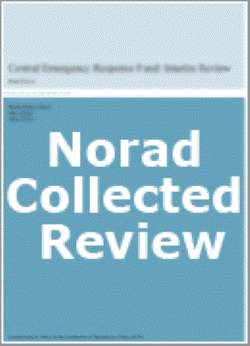Mid-term Review of: Enhancing Food Security and developing Sustainable Rural Livelihoods Project
Om publikasjonen
- Utgitt: oktober 2009
- Serie: Norad-innsamlede rapporter
- Type: --
- Utført av: Tore Laugerud, Nordic Consulting Group (NCG), Norway (team leader); Sera Rose Mkandawire, Bunda College of Agriculture, University of Malawi; Emmanuel James Kantchewa, (National Project Coordinator) Ministry of Agriculture and Food Security
- Bestilt av: Government of Malawi, Ministry of Agriculture and Food Security; FAO (UN Food and Agriculture Organization; Royal Norwegian Embassy, Lilongwe
- Land: Malawi
- Tema: Primærnæring (landbruk fiske skogbruk), Vann og sanitær, Næringsutvikling
- Antall sider: 122
- Serienummer: 11/2009
- ISBN: 978-82-7548-438-1
- ISSN: --
- Prosjektnummer: MWI-05/029

The Project
The project is managed by Food and Agriculture Organisation (FAO) and implemented by a Project Office in Liwonde/Balaka under the Ministry of Agriculture, Ministry of Irrigation and Water Development and Ministry of Local Government and Rural Development. The Government of Norway has provided FAO with a budget frame of NOK 33 mill, of which NOK 22 mill have been disbursed by Mid-2009.
The goal of the project is to alleviate the immediate problems of poverty and food security amongst the resource poor households, addressing their needs by better water control and the sustainable use of the environment. There are three main project components: 1) Small scale irrigation, water control and watershed development. 2) Intensification and diversification of farm production. 3) Capacity Building, Institutional Strengthening and Sustainability. The project was origianally designed to reach approx. 40,000 households, but was later revised downwards to 23,500 due to errors in budget calculation. The project involves the local governments of three districts, Mangochi, Balaka and Machinga.
Interesting Findings
- The Review team believes the project is relative successful as an overall rating, in general having more positive elements than negative ones. The main reason for this is that the efforts undertaken at community level are highly relevant. But various elements are not doing so well and have a large potential for improvement.
- Although having a project managerial set-up that is not fully integrated institutionally in the governmental system at district level this seems to be the most pragmatic solution in order to get things done in the remaining project period.
- It is noted that the most successful components are the CA (Conservation agriculture), irrigation with treadle pumps and the pass-on system of chickens and goats. Also the Village Banks and some Farmer Groups are showing positive developments, although in general the payback rate of revolving funds is lower than would have been hoped for. The diversification of crops (nutrition element) have not gained proper momentum, as there seems to be an in-built resistance in the area of introducing new crops, rather than the common maize and to some extent rice. The livestock groups in general are facing big challenges due to high price of feed.
- The project has weaknesses in project management and reporting.
- The gender aspect is well taken onboard in the project, with 64% of the beneficiaries being women.
- The project has so far shown some positive impacts, both regarding food security all year around for some families who before had to buy food during some periods of the year, and regarding increased livelihood through procurement of household goods. However, the project as a whole is clearly not sustainable in its present form. The government system/district authorities today are not able to properly follow up many of the ongoing activities, mainly due to lack of funding to sustain the operation, but also due to understaffing. Capacity building takes time and only two years remain of the project.
